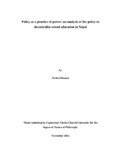Please use this identifier to cite or link to this item:
http://archive.nnl.gov.np:8080/handle/123456789/66| Title: | Policy as a practice of power: an analysis of the policy to decentralise school education in Nepal |
| Authors: | Khanal, Peshal |
| Keywords: | Schooling -- Nepal Decentralization - schools - Nepal Schools - community participations |
| Issue Date: | 25-Feb-2018 |
| Abstract: | This study analyses the policy to decentralise school education in Nepal focusing on how the experiences and interpretations of stakeholders provide insight into the meaning and tension of decentralisation and how the policy provisions of decentralisation are manifested in local school practices. Drawing upon the conceptual underpinning of the anthropology of policy and socio-cultural approach to policy analysis, this study looks at policy interpretations and actions on the ground. Employing a qualitative design and methodology, data are obtained from semi-structured interviews with the government officials and the leaders of the Teachers’ Union as well as from fieldwork (guided by ethnographic principles and methods) at three school sites. A general inductive approach has provided a broader guidance to the data analysis task, and drawing upon this approach a constant comparison method is used to analyse and make sense of the data. This study lends credence to the notion that rather than drawing merely upon official policy discourses, stakeholders conceptualise and interpret the meaning of decentralisation on the basis of their own schemes of interests, motivation and concerns. The decentralisation policy has evolved amidst the ongoing interplay of power within and beyond the government system, resulting in a divide of policy players between ‘power winner’ and ‘power loser’, empowering some while silencing others. Three overarching provisions of decentralisation are found significant at the implementation level – school transfer, community participation and local decision-making. In each of these areas, the policy mandates of decentralisation are contested, negotiated and appropriated on the ground, giving rise to a rather contextualised and localised form of the policy. This study paints a somewhat frustrating picture of the implementation of the decentralisation reform in Nepal due to problems such as the political and elite takeover/capture of the policy, teachers’ dissension and their less than supportive role as well as the misuse of teacher selection authority at the local level. Nevertheless, decentralisation could be a desirable policy option for Nepali schools provided that certain preconditions are met. This thesis concludes with my broader reflection on the decentralisation policy which I conceive as, and argue to be, a practice of power and with a brief discussion on what lessons this study can provide for other countries with similar socio-political characteristics as that of Nepal. |
| Description: | Thesis submitted to Canterbury Christ Church University for the degree of Doctor of Philosophy, 2012. |
| URI: | http://103.69.125.248:8080/xmlui/handle/123456789/66 |
| Appears in Collections: | 300 Social sciences |
Files in This Item:
| File | Description | Size | Format | |
|---|---|---|---|---|
| Final Thesis.pdf | 1.83 MB | Adobe PDF |  View/Open |
Items in DSpace are protected by copyright, with all rights reserved, unless otherwise indicated.